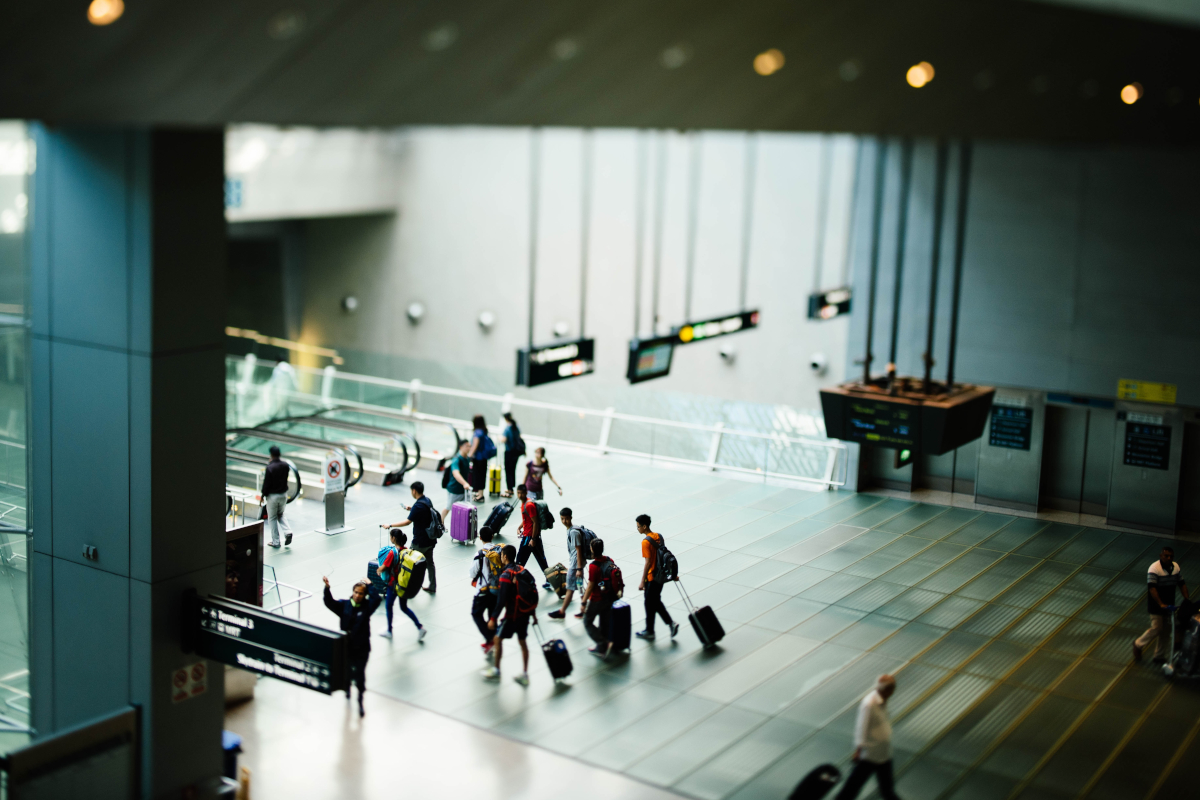UN travel surveillance system needs “pause and urgent review”, says Special Rapporteur
Topic
Country/Region
05 December 2023
A UN Special Rapporteur has called for a pause to the roll-out of an UN-sponsored travel surveillance system, and for an urgent review to be initiated. The international exchange of travellers’ information amongst police and border forces is on the rise but access to remedies remains limited, leaving gaps in the protection of individual rights. Azerbaijan, a state that imprisons political opponents and that has been accused of committing genocide, is one of dozens of countries that have received UN assistance.
Support our work: become a Friend of Statewatch from as little as £1/€1 per month.

Image: CHUTTERSNAP, Unsplash
Global travel surveillance obligations
While the UN’s failure to prevent or effectively respond to many major international crises has led some to argue that the decision-making process is tied up in a Gordian knot, there is at least one topic on which there is common agreement: the fight against terrorism, and the deployment of an international surveillance infrastructure for that purpose.
In 2014, the UN Security Council adopted Resolution 2178, obliging every member state to monitor the travel of foreign terrorist fighters via “evidence–based traveller risk assessment and screening procedures including collection and analysis of travel data.”
In practice, this requires gathering the data of all travellers – something that is done through the collection and exchange of Advance Passenger Information (API, data taken from passports) and Passenger Name Record data (taken from travel bookings with airlines, travel agencies and other companies).
This information is forwarded by airlines to law enforcement agencies to be checked against lists of wanted or suspected individuals, run through profiling algorithms to detect individuals who may be of interest to the authorities, and shared with other agencies in the same country or abroad.
The UN Countering Terrorist Travel programme, created in 2019, aims to assist member states in setting up API and PNR systems. To support the roll-out of those systems worldwide, the Netherlands donated its travel data analysis software, goTravel, to the UN, for distribution to willing member states.
The software makes it possible for states to:
“…obtain passenger data from (airline) carriers and conduct targeted analysis as well as share the findings of their data assessment. Member States adopt the UN-owned and operated goTravel solution to enable the automated analysis of large data volumes on passengers on all inbound and outbound traffic and to remain in compliance with international human rights and privacy standards.”
Human rights out of sight
The Countering Terrorist Travel programme supposedly relies on an “all of UN approach,” but a position paper (pdf) published at the end of October by Fionnuala Ní Aoláin, who recently ended her term as the Special Rapporteur on the Promotion and Protection of Human Rights while Countering Terrorism, says otherwise.
“Two of the agencies most directly concerned with the rights of individuals in the border management context, namely the United Nations High Commissioner for Refugees (‘UNHCR’) and the Office of the High Commissioner for Human Rights (‘OHCHR’), were not identified as partners in the programme at its launch,” says the paper.
This is far from the only problem highlighted by Professor Ní Aoláin, however – the position paper details a number of ways in which the export and establishment of travel surveillance systems around the world may violate human rights, and gives recommendations on the way forward.
System accuracy
Underpinning the development and deployment of travel surveillance systems is a premise that states need to use algorithmic surveillance to identify threatening or risky individuals travelling to their territory. The collection and processing of API and PNR data is presented as a way to mitigate potential risks posed by the increase in international travel. Instead of relying solely on manual checks by border guards, these systems aim to assist in the selection of people to be stopped and further investigated.
However, as the Special Rapporteur says in the position paper:
“…goTravel software is an experimental software program which… has never been subject to formal review in respect of its accuracy rate in identifying named individuals, much less the accuracy of its use in any risk-based profiling system.”
In Germany, the government has admitted that its own travel surveillance system has:
“…a success rate of only 0.1%, meaning that 99.9 % of all air passengers – about 169,830,000 people, according to the Government’s forecasts – will be unnecessarily subjected to the processing of sensitive data. And this does not even account for the ‘false positives’ within the 0.1 % (i.e. those who have been flagged by the system in error as a person of interest).”
As the Special Rapporteur highlights, deploying these systems around the world will affect “billions of air travellers every year,” yet “even a miniscule error rate of a tenth of one percent would mean millions of false positives/negatives.”
Risk of discrimination
Citing previous work by the UN’s High Commissioner for Human Rights, the position paper notes that AI systems “carry an inherent risk of perpetuating or even enhancing discrimination, reflecting embedded historic racial and ethnic bias in the data sets used, such as a disproportionate focus of policing of certain minorities.”
While the Security Council’s 2014 resolution encourages member states to collect and process travel data “without resorting to profiling based on stereotypes founded on grounds of discrimination prohibited by international law,” no steps have been taken to monitor the ways states are respecting their obligations in this regard.
In the Netherlands, a court ordered a halt last year to the border police’s practice of using ethnicity as criteria for deciding who to stop and search, while an investigation by Lighthouse Reports found that the authorities were using an algorithm to profile visa applicants prior to their arrival. The criteria used as part of the travel surveillance systems in the Netherlands and elsewhere in the world remain unknown, but the Special Rapporteur notes that it is “particularly problematic from the point of view of human rights compliance” if AI technology is used to process travel data.
No kill switch
Human rights bodies have expressed serious concerns about several beneficiary states of the UN Countering Terrorist Travel programme.
Azerbaijan, for example, opened a Passenger Information Center with support from the UN and “development partners” in January 2022, and in June of that year signed a Memorandum of Understanding to “accelerate the delivery of comprehensive technical assistance to Azerbaijan under the United Nations Countering Terrorist Travel (CT Travel) Programme.”
“The agreement lays out the foundation of a strategic partnership to assist the Government of Azerbaijan to implement the programmatic roadmap for the use of the United Nations ‘goTravel’ technology in compliance with international law, in particular, international human rights, refugee and international humanitarian law,” said a UN press release (pdf).
Just two years prior, a Council of Europe Parliamentary Assembly resolution highlighted cases of Azerbaijani political prisoners. Airports have provided a key point of control for the state: political refugees deported from Germany have been arrested on arrival and a Nobel nominee was prevented from leaving the country to attend an Italian literary festival.
In September this year, the former prosecutor of the International Criminal Court accused Azerbaijan of committing a genocide against the Armenian population under its control. The UN Security Council opts not to issue a statement on the situation.
Despite the risks, UN bodies responsible for promoting the deployment of travel surveillance systems have admitted that they “cannot enforce” commitments set out in memoranda of understanding on member states, “and many external factors (e.g., political change, economic downturn) will impact upon the likelihood of the [member state] adhering to those commitments.”
In her position paper, Ní Aoláin highlights that “there are a number of States with extremely concerning records of systematic human rights abuse” that have benefited from the Counter Terrorist Travel programme, and condemns “the provision of powerful data monitoring tools to regimes with histories of such violations.”
This “either indicates that rigorous analysis of human rights concerns cannot have been conducted, or, if conducted, cannot have been afforded sufficient weight,” the paper argues.
Lack of access to remedies
While UN bodies are working to develop and deploy the technical and bureaucratic systems required for widespread travel surveillance and passenger profiling, there is no court or supervisory authority at the UN level that can deal with the protection of individual rights.
Anyone seeking to contest a decision made on the basis of travel data will have to rely on remedies available at national level, but Ní Aoláin notes that individuals doing so:
“…will commonly face considerable obstacles posed by, among other things: lack of legal representations (often exacerbated by ineligibility for legal aid due to foreign nationality), lack of awareness of the State’s administrative or legal system, language barriers, etc.”
Individuals seeking to exercise one of their key data protection rights may also face obstacles. An investigation into the possibility of exercising that right in relation to PNR data in 11 EU member states found there was “room for improvement in order to facilitate and provide for a more transparent and comprehensive procedure to be followed by data subjects who wish to exercise their right to access.”
Pause and review
The former Special Rapporteur’s condemnation of the UN’s support for surveillance and profiling systems is explicit:
“The CT Travel Programme’s API and PNR collection and sharing system was never designed with human rights in mind… [The UN is] placing immensely powerful tools in the hands of States which may misuse them, intentionally or inadvertently, to jeopardize human rights, without any evidence of sufficient prior vetting, and without any practical or legal recourse to prevent or sanction such misuse.”
The Countering Terrorist Travel Programme and UN provision of the goTravel software to member states “represents a profound human rights risk and a serious reputational risk for the UN itself,” says Ní Aoláin’s position paper. She says for the provision of the system “must be paused and an urgent review initiated.”
With her term in office over, and a new Special Rapporteur recently appointed, it remains to be seen whether they will continue to press UN bodies on the issue – and whether those bodies will take note of the critique.
Documentation
Our work is only possible with your support.
Become a Friend of Statewatch from as little as £1/€1 per month.
Further reading

New technologies having devastating impact on rights in counter-terrorism policy, says UN Special Rapporteur
"New technologies, particularly digital technologies, are transforming the ways in which human rights are impeded and violated around the world," says a damning new report by the Special Rapporteur on the promotion and protection of human rights and fundamental freedoms while countering terrorism, Fionnuala Ní Aoláin. The report "addresses the intersection of counter-terrorism and preventing and countering violent extremism with the use of new technologies," and condemns "the elevation of blinkered security thinking that has accompanied a particularly restrictive approach to countering terrorism".

Biometrics and counter-terrorism: UN briefing shows global spread of technology
The UN's Counter-Terrorism Executive Directorate (CTED) recently published a briefing on the use of biometrics for counter-terrorism purposes, offering a snapshot of how states around the world are increasingly deploying biometric technology.

Arriving soon: global air travel surveillance and passenger profiling with no democratic control
The ICAO, Interpol and various UN bodies are continuing their efforts to aid the establishment of systems for the surveillance of air travel and the automated profiling of passengers.
Spotted an error? If you've spotted a problem with this page, just click once to let us know.

